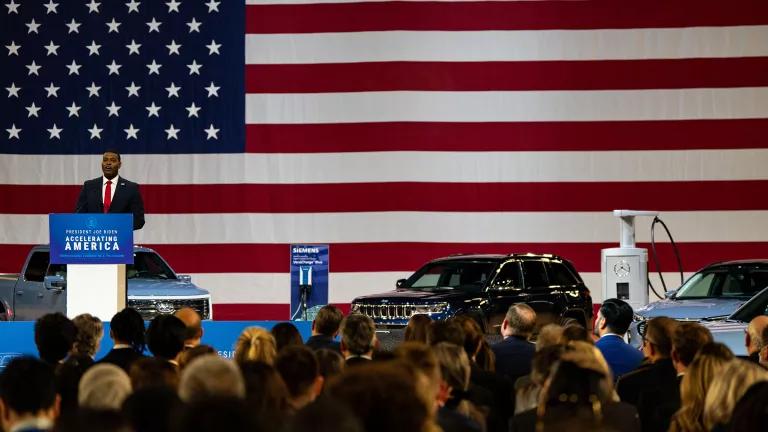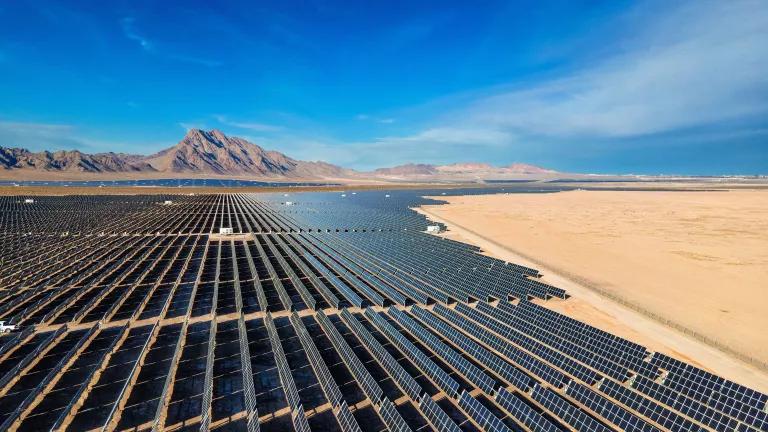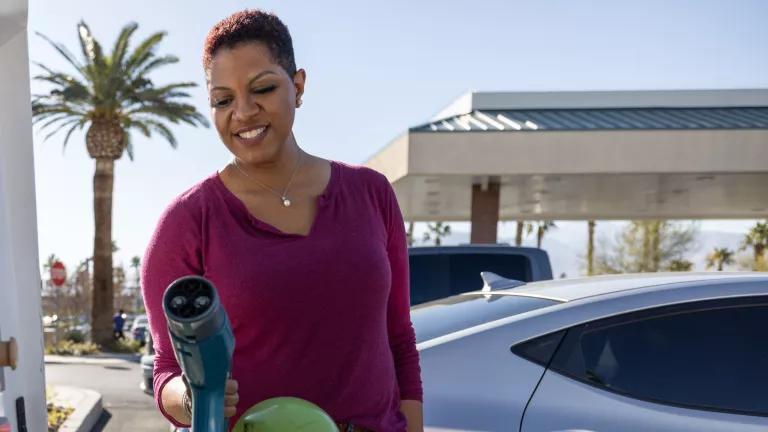California, long a land of pioneers, leads the nation in developing emissions standards to reduce pollution from cars and trucks. These standards have cleaned up the Golden State’s air, and have benefited other states following California’s lead.
Changes brewing in Washington could threaten these gains. Scott Pruitt’s statements during his confirmation hearing to lead the U.S. Environmental Protection Agency (EPA) and automakers’ recent request to reconsider Obama-era carbon pollution standards signal the first stabs at killing the progress made through California’s clean cars program.
But EPA and automakers will face an uphill battle in any attempts to undermine California’s clean cars program.
The Clean Air Act Gives California Independent Authority to Set Its Own Standards
As recently as the 1970s, heavy smog blanketed California, including downtown Los Angeles, sickening schoolchildren and stunting cash crops. In the 1950s, years before federal regulators took action, California regulators pioneered state standards to curb the emissions from cars and trucks that create smog pollution and drive climate change.
Starting in 1967, U.S. Congress recognized California’s unique role as the nation’s leader in setting pollution standards for motor vehicles, codifying that role in the Clean Air Act.
Ordinarily, EPA has prime authority to set pollution standards for motor vehicles. Section 209 of the Clean Air Act empowers California to set its own emission standards for new motor vehicles, subject only to a waiver from the federal EPA that can be denied only in the most extraordinary circumstances. Section 177 of the Act allows other states to choose California’s car standards over federal ones, moving together with California to clean up their air. More than a dozen states have adopted California’s standards. California standards usually lead federal standards by a few years, until the national government catches up with the Golden State.
Thanks to these actions, millions of Americans breathe easier and the nation’s climate pollution is in decline.
Automakers lobbied and litigated against California’s clean car standards for decades. In 2009, a historic clean cars peace treaty was brokered between automakers, federal regulators, California, and environmental organizations like NRDC. The parties agreed on a National Program providing automakers uniform standards for carbon pollution from automobiles and trucks, and providing states and the environmental community assurances of substantial pollution reductions and fuel savings. The deal ended years of failed lawsuits by automakers. A core principle of the deal is that California preserves its authority to enforce its own standards if the federal standards are not sufficiently strong enough to meet state requirements for carbon reductions.
Progress in cleaning up air quality and limiting climate pollution is still vitally needed, especially in California. Six of the most polluted U.S. cities in terms of smog are located in California, according to the American Lung Association. And more than 32 million Californians (84 percent) live in counties affected by unhealthy air. Californians are already suffering from the effects of climate change, which include record-breaking heatwaves, a diminished snowpack, and an intense drought.
Can EPA Simply Revoke California’s Waiver Overnight?
EPA granted California’s waiver for its motor vehicle carbon pollution standards in January 2013, approving the state’s package of emissions requirements through 2025. In January 2017, EPA issued a final determination to keep existing federal carbon pollution standards in place through 2025, ensuring consistency between federal and California motor vehicle carbon pollution standards.
Automakers have asked to unravel that final determination, and could seek to weaken federal standards through 2025. If EPA caves to pressure from automakers and weakens federal standards, it could also take the unprecedented step of reneging on California’s authority to craft its own standards.
Scott Pruitt cracked open a Pandora’s box in his confirmation hearings by suggesting that EPA might revisit California’s waiver. When California Senator Kamala Harris questioned Pruitt during his U.S. Senate confirmation hearing, he said, “Administrators in the past have not granted the waiver and have granted the waiver…[t]hat is a review process that will be conducted.”
No. Revoking a Waiver Would Be Unprecedented.
Undoing California’s waiver would disrupt the carefully brokered clean car peace treaty. And there is no easy road to revoking the waiver.
EPA would need to go through a rulemaking process to undo it. Public notice-and-comment rulemaking, which usually takes one to three years, would almost certainly be followed by a challenge in court. EPA would need to contradict the extensive evidence in the record supporting California’s current waiver, a difficult feat, and one likely to be rejected in court. Courts look with skepticism on agency policy reversals contradicting earlier factual findings.
EPA has never revoked a California waiver for automobile carbon pollution standards. If Pruitt were to revoke it, he would upend well-established statutory protections for California residents, and depart from decades of EPA practice. He would also be blocking the rights of other states that can adopt California’s stricter standards to help address their air quality concerns.
Denying Any Future Waiver Goes Against Statute and EPA’s Past Practice.
California’s carbon pollution standards for cars and trucks sold in 2026 or later could require another waiver. If EPA denies a future waiver, it would undoubtedly be challenged, based on long-standing law which allows reversal of EPA rules that are “arbitrary, capricious, an abuse of discretion, or otherwise not in accordance with law....” Given the Clean Air Act’s great deference to California’s authority to set state automobile standards, denial of a factually well-supported waiver has very high odds of being tossed out in court.
Section 209 says the waiver must be granted if California’s standards are “at least as protective of public health and welfare as applicable Federal standards.” EPA can deny a waiver in a narrow set of circumstances but of the more than 100 waivers the agency considered since the 1970s, only one was denied and that decision was later reversed by EPA.
Congress specifically designed Section 209 to give California great latitude in addressing its serious air quality problems (a result of local geography and high rates of car usage), stating “standards on automobile emissions which may, from time to time, need to be more stringent than national standards.” In further amendments, “Congress consciously chose to permit California to blaze its own trail with a minimum of federal oversight.”
In granting the most recent waiver to California, EPA stated that Section 209 was designed to “ensure that the federal government did not second-guess state policy choices,” and repeated language from past waivers affirming California’s independence and stating that “waiver requests cannot be denied...” except where limited statutory circumstances are present, and that the waiver must be granted where California requirements are “more stringent than applicable Federal requirements...[and] may result in some further reduction in air pollution in California.”
We’re Ready
The specific threats Scott Pruitt’s EPA could pose to California clean car standards are still speculative. But it is clear that California and other states are ready to fight for their rights to clean up air quality and combat climate change. In his recent state of the state speech, Governor Jerry Brown affirmed his commitment to press forward with curbing climate change: “[w]e cannot fall back and give in to the climate change deniers. The science is clear. The danger is real. We can do much on our own and we can join with others—other states and provinces and even countries, to stop the dangerous rise in climate pollution. And we will.”
Environmental advocates like NRDC stand ready to join the fight. If Pruitt, or any other potential EPA administrator, seeks to undo California’s clean car standards, we’ll be waiting to fight back.




